Critical Analysis: Sustainable Marketing and Management at Tesla
VerifiedAdded on 2023/03/21
|10
|2349
|52
Report
AI Summary
This report provides a critical analysis of Tesla's sustainable marketing and management practices. It begins with an overview of Tesla, its mission, and its approach to the automotive and energy industries. The report then delves into Tesla's sustainability strategy, focusing on its environmental initiatives and customer-oriented marketing. It explores key principles like scarcity, efficiency, and sovereignty and how Tesla incorporates them. The analysis examines how Tesla accelerates electric vehicles, increases power capacity, and utilizes new technologies to drive collaboration. The report further discusses Tesla's focus on customer value, societal marketing, and innovative marketing, highlighting its CSR strategies and their impact. The conclusion emphasizes the importance of sustainability for organizational growth and success, highlighting Tesla's progress towards achieving it.
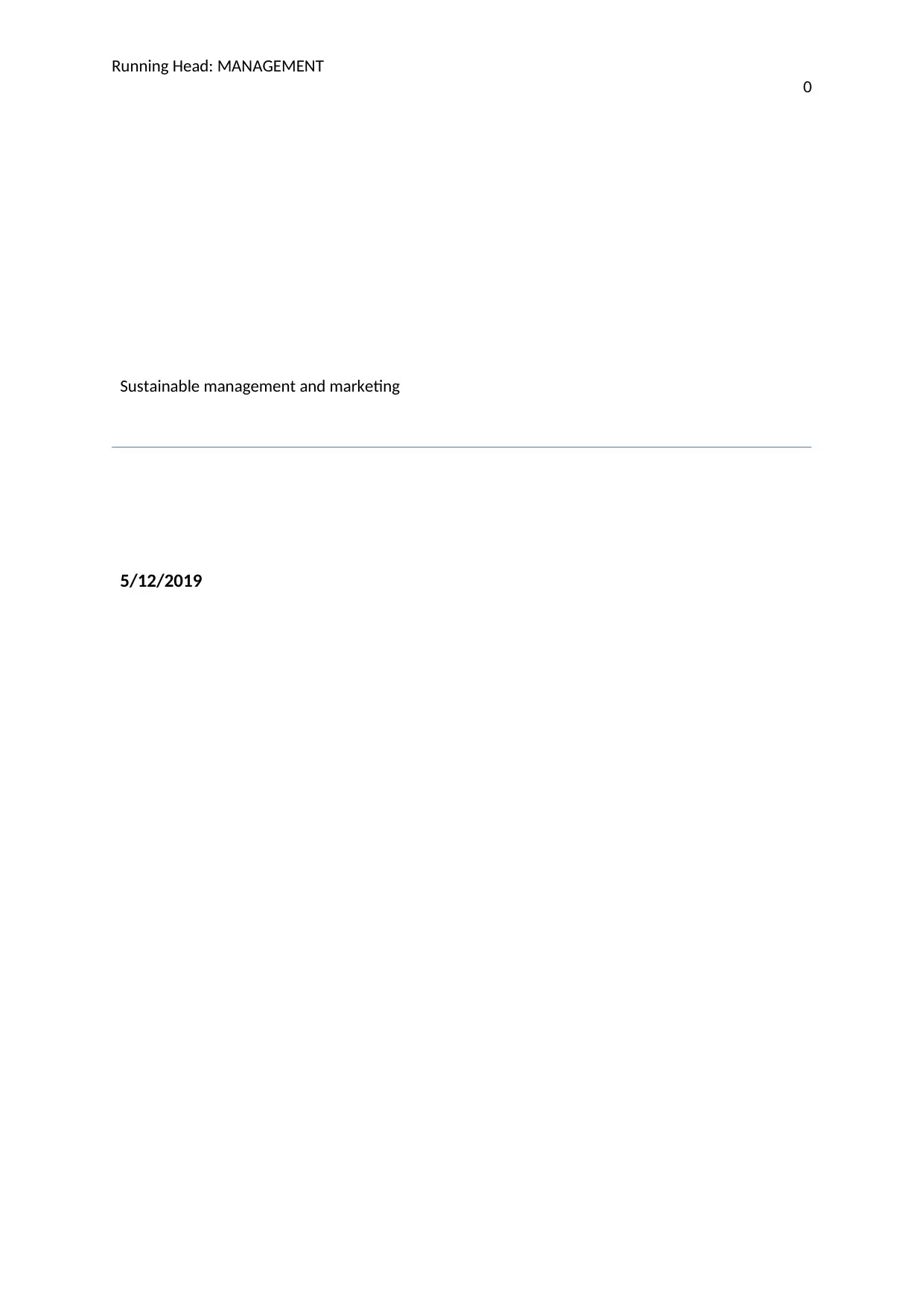
Running Head: MANAGEMENT
0
Sustainable management and marketing
5/12/2019
0
Sustainable management and marketing
5/12/2019
Secure Best Marks with AI Grader
Need help grading? Try our AI Grader for instant feedback on your assignments.
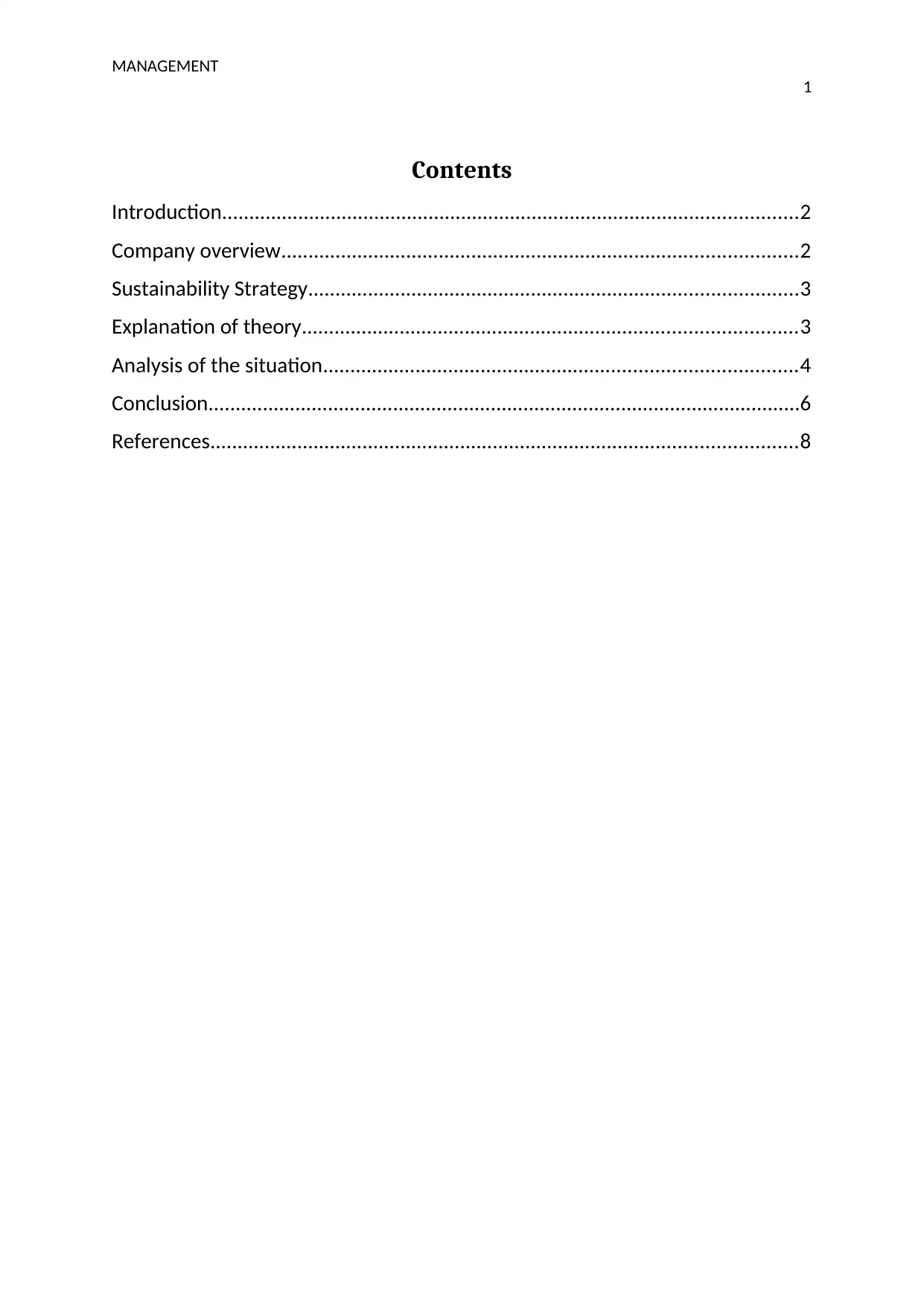
MANAGEMENT
1
Contents
Introduction..........................................................................................................2
Company overview...............................................................................................2
Sustainability Strategy..........................................................................................3
Explanation of theory...........................................................................................3
Analysis of the situation.......................................................................................4
Conclusion.............................................................................................................6
References............................................................................................................8
1
Contents
Introduction..........................................................................................................2
Company overview...............................................................................................2
Sustainability Strategy..........................................................................................3
Explanation of theory...........................................................................................3
Analysis of the situation.......................................................................................4
Conclusion.............................................................................................................6
References............................................................................................................8
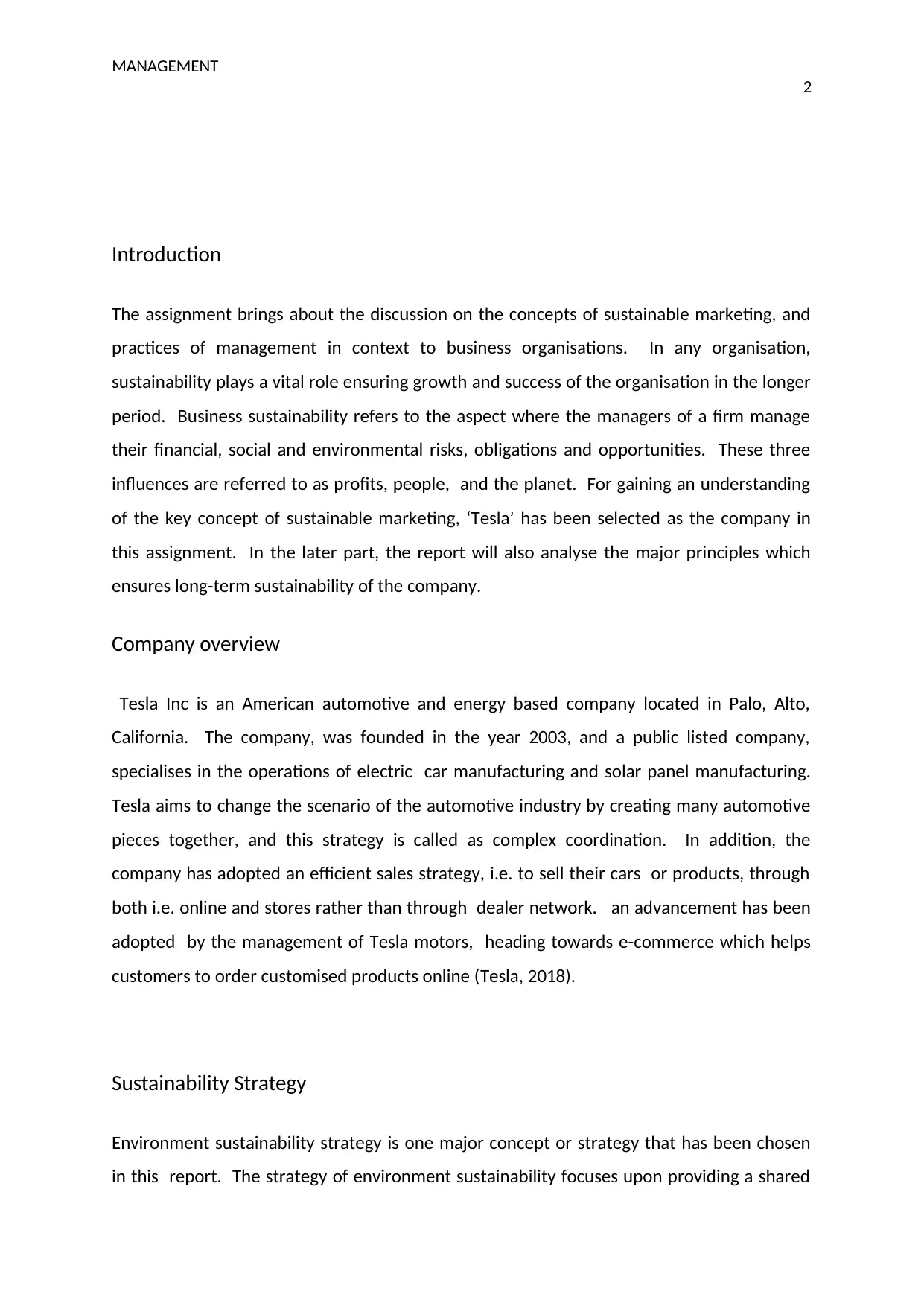
MANAGEMENT
2
Introduction
The assignment brings about the discussion on the concepts of sustainable marketing, and
practices of management in context to business organisations. In any organisation,
sustainability plays a vital role ensuring growth and success of the organisation in the longer
period. Business sustainability refers to the aspect where the managers of a firm manage
their financial, social and environmental risks, obligations and opportunities. These three
influences are referred to as profits, people, and the planet. For gaining an understanding
of the key concept of sustainable marketing, ‘Tesla’ has been selected as the company in
this assignment. In the later part, the report will also analyse the major principles which
ensures long-term sustainability of the company.
Company overview
Tesla Inc is an American automotive and energy based company located in Palo, Alto,
California. The company, was founded in the year 2003, and a public listed company,
specialises in the operations of electric car manufacturing and solar panel manufacturing.
Tesla aims to change the scenario of the automotive industry by creating many automotive
pieces together, and this strategy is called as complex coordination. In addition, the
company has adopted an efficient sales strategy, i.e. to sell their cars or products, through
both i.e. online and stores rather than through dealer network. an advancement has been
adopted by the management of Tesla motors, heading towards e-commerce which helps
customers to order customised products online (Tesla, 2018).
Sustainability Strategy
Environment sustainability strategy is one major concept or strategy that has been chosen
in this report. The strategy of environment sustainability focuses upon providing a shared
2
Introduction
The assignment brings about the discussion on the concepts of sustainable marketing, and
practices of management in context to business organisations. In any organisation,
sustainability plays a vital role ensuring growth and success of the organisation in the longer
period. Business sustainability refers to the aspect where the managers of a firm manage
their financial, social and environmental risks, obligations and opportunities. These three
influences are referred to as profits, people, and the planet. For gaining an understanding
of the key concept of sustainable marketing, ‘Tesla’ has been selected as the company in
this assignment. In the later part, the report will also analyse the major principles which
ensures long-term sustainability of the company.
Company overview
Tesla Inc is an American automotive and energy based company located in Palo, Alto,
California. The company, was founded in the year 2003, and a public listed company,
specialises in the operations of electric car manufacturing and solar panel manufacturing.
Tesla aims to change the scenario of the automotive industry by creating many automotive
pieces together, and this strategy is called as complex coordination. In addition, the
company has adopted an efficient sales strategy, i.e. to sell their cars or products, through
both i.e. online and stores rather than through dealer network. an advancement has been
adopted by the management of Tesla motors, heading towards e-commerce which helps
customers to order customised products online (Tesla, 2018).
Sustainability Strategy
Environment sustainability strategy is one major concept or strategy that has been chosen
in this report. The strategy of environment sustainability focuses upon providing a shared
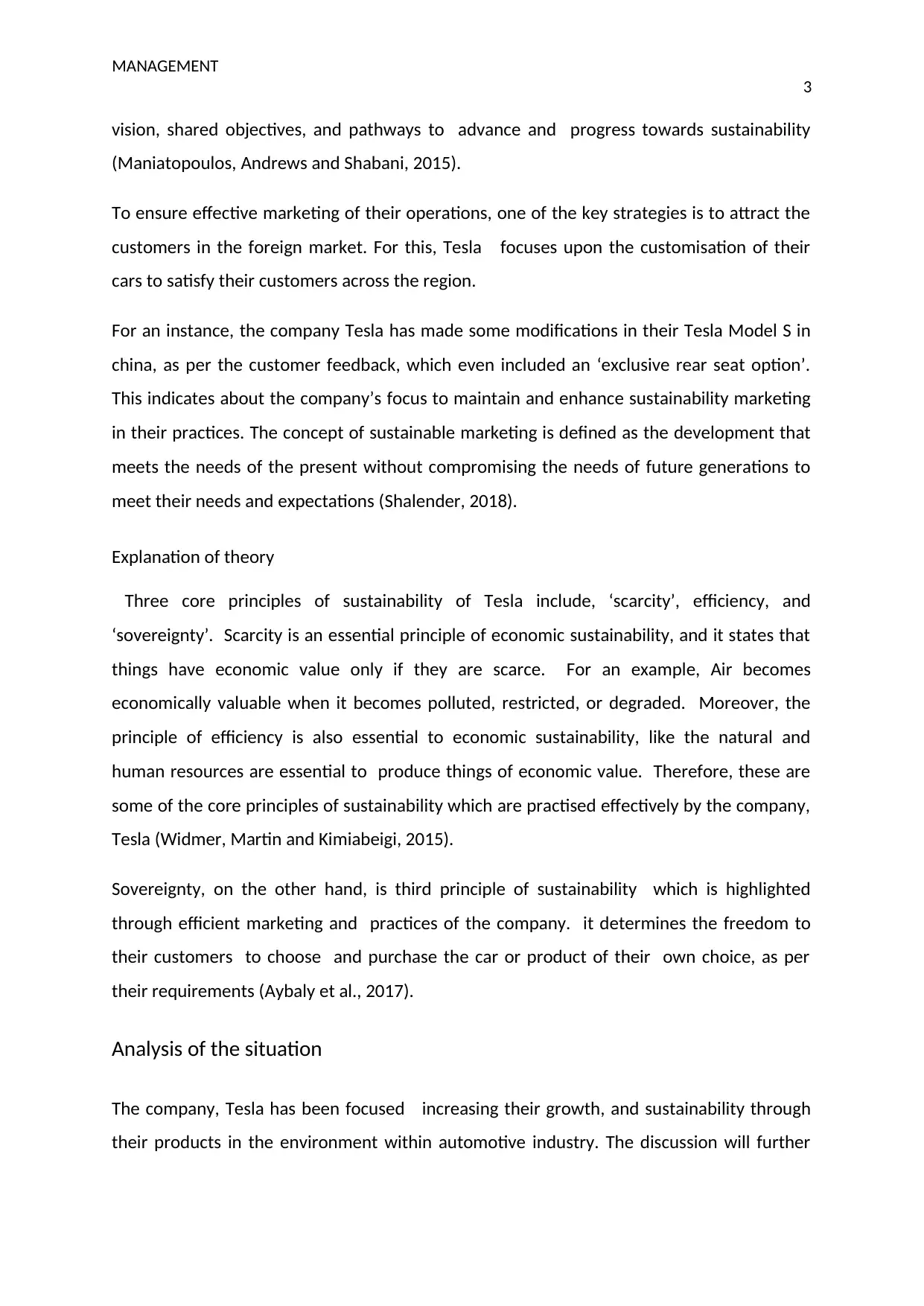
MANAGEMENT
3
vision, shared objectives, and pathways to advance and progress towards sustainability
(Maniatopoulos, Andrews and Shabani, 2015).
To ensure effective marketing of their operations, one of the key strategies is to attract the
customers in the foreign market. For this, Tesla focuses upon the customisation of their
cars to satisfy their customers across the region.
For an instance, the company Tesla has made some modifications in their Tesla Model S in
china, as per the customer feedback, which even included an ‘exclusive rear seat option’.
This indicates about the company’s focus to maintain and enhance sustainability marketing
in their practices. The concept of sustainable marketing is defined as the development that
meets the needs of the present without compromising the needs of future generations to
meet their needs and expectations (Shalender, 2018).
Explanation of theory
Three core principles of sustainability of Tesla include, ‘scarcity’, efficiency, and
‘sovereignty’. Scarcity is an essential principle of economic sustainability, and it states that
things have economic value only if they are scarce. For an example, Air becomes
economically valuable when it becomes polluted, restricted, or degraded. Moreover, the
principle of efficiency is also essential to economic sustainability, like the natural and
human resources are essential to produce things of economic value. Therefore, these are
some of the core principles of sustainability which are practised effectively by the company,
Tesla (Widmer, Martin and Kimiabeigi, 2015).
Sovereignty, on the other hand, is third principle of sustainability which is highlighted
through efficient marketing and practices of the company. it determines the freedom to
their customers to choose and purchase the car or product of their own choice, as per
their requirements (Aybaly et al., 2017).
Analysis of the situation
The company, Tesla has been focused increasing their growth, and sustainability through
their products in the environment within automotive industry. The discussion will further
3
vision, shared objectives, and pathways to advance and progress towards sustainability
(Maniatopoulos, Andrews and Shabani, 2015).
To ensure effective marketing of their operations, one of the key strategies is to attract the
customers in the foreign market. For this, Tesla focuses upon the customisation of their
cars to satisfy their customers across the region.
For an instance, the company Tesla has made some modifications in their Tesla Model S in
china, as per the customer feedback, which even included an ‘exclusive rear seat option’.
This indicates about the company’s focus to maintain and enhance sustainability marketing
in their practices. The concept of sustainable marketing is defined as the development that
meets the needs of the present without compromising the needs of future generations to
meet their needs and expectations (Shalender, 2018).
Explanation of theory
Three core principles of sustainability of Tesla include, ‘scarcity’, efficiency, and
‘sovereignty’. Scarcity is an essential principle of economic sustainability, and it states that
things have economic value only if they are scarce. For an example, Air becomes
economically valuable when it becomes polluted, restricted, or degraded. Moreover, the
principle of efficiency is also essential to economic sustainability, like the natural and
human resources are essential to produce things of economic value. Therefore, these are
some of the core principles of sustainability which are practised effectively by the company,
Tesla (Widmer, Martin and Kimiabeigi, 2015).
Sovereignty, on the other hand, is third principle of sustainability which is highlighted
through efficient marketing and practices of the company. it determines the freedom to
their customers to choose and purchase the car or product of their own choice, as per
their requirements (Aybaly et al., 2017).
Analysis of the situation
The company, Tesla has been focused increasing their growth, and sustainability through
their products in the environment within automotive industry. The discussion will further
Secure Best Marks with AI Grader
Need help grading? Try our AI Grader for instant feedback on your assignments.
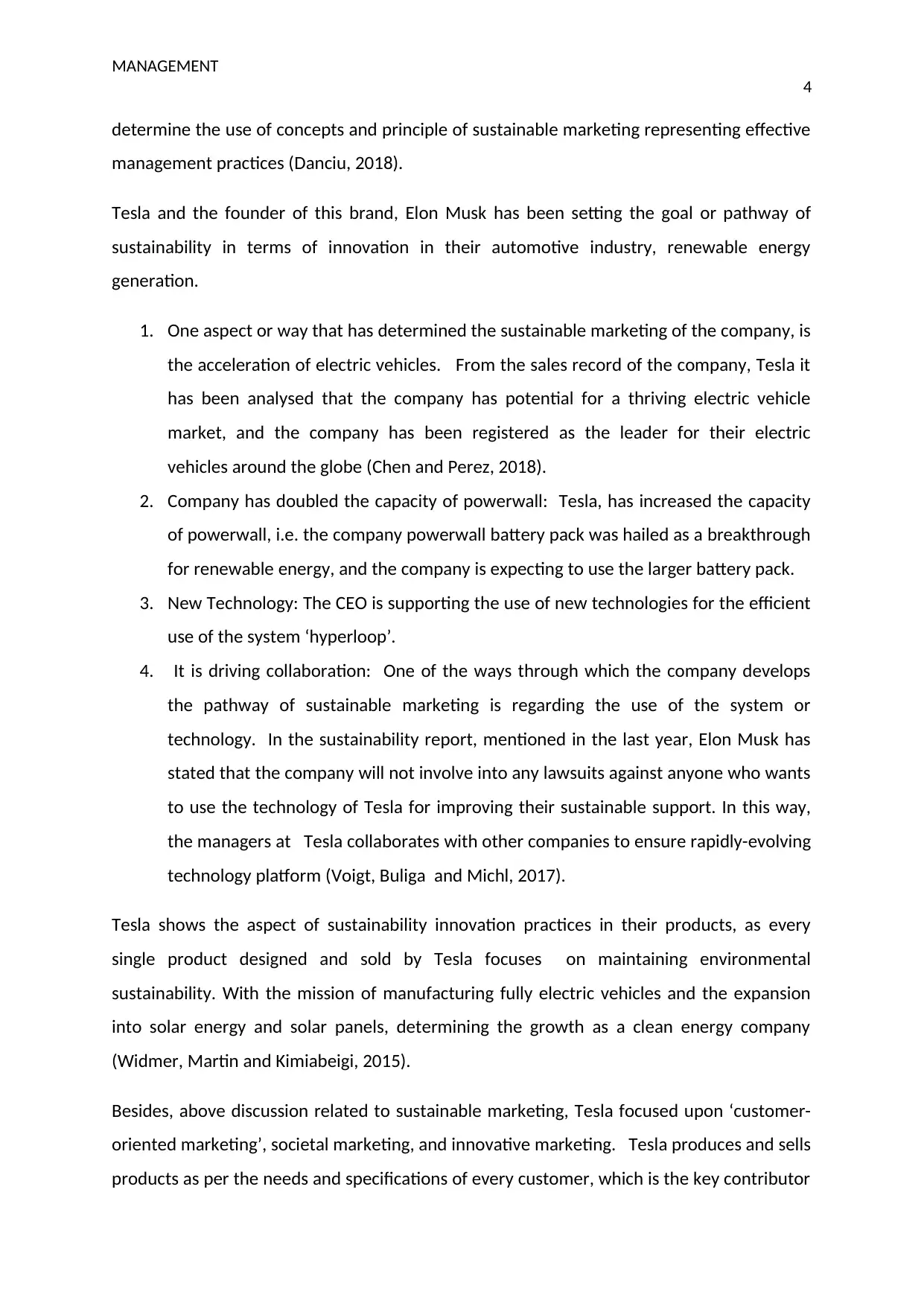
MANAGEMENT
4
determine the use of concepts and principle of sustainable marketing representing effective
management practices (Danciu, 2018).
Tesla and the founder of this brand, Elon Musk has been setting the goal or pathway of
sustainability in terms of innovation in their automotive industry, renewable energy
generation.
1. One aspect or way that has determined the sustainable marketing of the company, is
the acceleration of electric vehicles. From the sales record of the company, Tesla it
has been analysed that the company has potential for a thriving electric vehicle
market, and the company has been registered as the leader for their electric
vehicles around the globe (Chen and Perez, 2018).
2. Company has doubled the capacity of powerwall: Tesla, has increased the capacity
of powerwall, i.e. the company powerwall battery pack was hailed as a breakthrough
for renewable energy, and the company is expecting to use the larger battery pack.
3. New Technology: The CEO is supporting the use of new technologies for the efficient
use of the system ‘hyperloop’.
4. It is driving collaboration: One of the ways through which the company develops
the pathway of sustainable marketing is regarding the use of the system or
technology. In the sustainability report, mentioned in the last year, Elon Musk has
stated that the company will not involve into any lawsuits against anyone who wants
to use the technology of Tesla for improving their sustainable support. In this way,
the managers at Tesla collaborates with other companies to ensure rapidly-evolving
technology platform (Voigt, Buliga and Michl, 2017).
Tesla shows the aspect of sustainability innovation practices in their products, as every
single product designed and sold by Tesla focuses on maintaining environmental
sustainability. With the mission of manufacturing fully electric vehicles and the expansion
into solar energy and solar panels, determining the growth as a clean energy company
(Widmer, Martin and Kimiabeigi, 2015).
Besides, above discussion related to sustainable marketing, Tesla focused upon ‘customer-
oriented marketing’, societal marketing, and innovative marketing. Tesla produces and sells
products as per the needs and specifications of every customer, which is the key contributor
4
determine the use of concepts and principle of sustainable marketing representing effective
management practices (Danciu, 2018).
Tesla and the founder of this brand, Elon Musk has been setting the goal or pathway of
sustainability in terms of innovation in their automotive industry, renewable energy
generation.
1. One aspect or way that has determined the sustainable marketing of the company, is
the acceleration of electric vehicles. From the sales record of the company, Tesla it
has been analysed that the company has potential for a thriving electric vehicle
market, and the company has been registered as the leader for their electric
vehicles around the globe (Chen and Perez, 2018).
2. Company has doubled the capacity of powerwall: Tesla, has increased the capacity
of powerwall, i.e. the company powerwall battery pack was hailed as a breakthrough
for renewable energy, and the company is expecting to use the larger battery pack.
3. New Technology: The CEO is supporting the use of new technologies for the efficient
use of the system ‘hyperloop’.
4. It is driving collaboration: One of the ways through which the company develops
the pathway of sustainable marketing is regarding the use of the system or
technology. In the sustainability report, mentioned in the last year, Elon Musk has
stated that the company will not involve into any lawsuits against anyone who wants
to use the technology of Tesla for improving their sustainable support. In this way,
the managers at Tesla collaborates with other companies to ensure rapidly-evolving
technology platform (Voigt, Buliga and Michl, 2017).
Tesla shows the aspect of sustainability innovation practices in their products, as every
single product designed and sold by Tesla focuses on maintaining environmental
sustainability. With the mission of manufacturing fully electric vehicles and the expansion
into solar energy and solar panels, determining the growth as a clean energy company
(Widmer, Martin and Kimiabeigi, 2015).
Besides, above discussion related to sustainable marketing, Tesla focused upon ‘customer-
oriented marketing’, societal marketing, and innovative marketing. Tesla produces and sells
products as per the needs and specifications of every customer, which is the key contributor
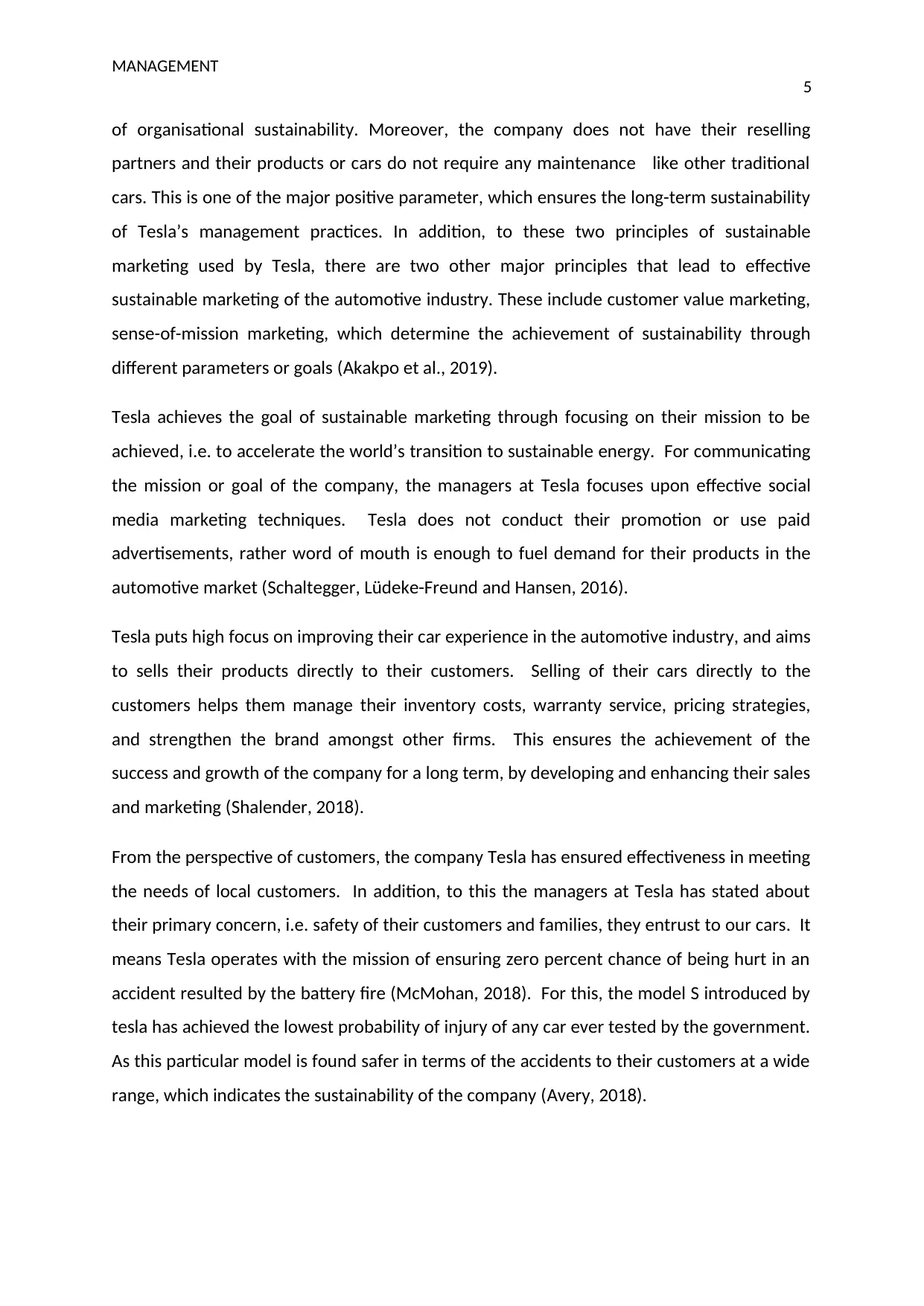
MANAGEMENT
5
of organisational sustainability. Moreover, the company does not have their reselling
partners and their products or cars do not require any maintenance like other traditional
cars. This is one of the major positive parameter, which ensures the long-term sustainability
of Tesla’s management practices. In addition, to these two principles of sustainable
marketing used by Tesla, there are two other major principles that lead to effective
sustainable marketing of the automotive industry. These include customer value marketing,
sense-of-mission marketing, which determine the achievement of sustainability through
different parameters or goals (Akakpo et al., 2019).
Tesla achieves the goal of sustainable marketing through focusing on their mission to be
achieved, i.e. to accelerate the world’s transition to sustainable energy. For communicating
the mission or goal of the company, the managers at Tesla focuses upon effective social
media marketing techniques. Tesla does not conduct their promotion or use paid
advertisements, rather word of mouth is enough to fuel demand for their products in the
automotive market (Schaltegger, Lüdeke-Freund and Hansen, 2016).
Tesla puts high focus on improving their car experience in the automotive industry, and aims
to sells their products directly to their customers. Selling of their cars directly to the
customers helps them manage their inventory costs, warranty service, pricing strategies,
and strengthen the brand amongst other firms. This ensures the achievement of the
success and growth of the company for a long term, by developing and enhancing their sales
and marketing (Shalender, 2018).
From the perspective of customers, the company Tesla has ensured effectiveness in meeting
the needs of local customers. In addition, to this the managers at Tesla has stated about
their primary concern, i.e. safety of their customers and families, they entrust to our cars. It
means Tesla operates with the mission of ensuring zero percent chance of being hurt in an
accident resulted by the battery fire (McMohan, 2018). For this, the model S introduced by
tesla has achieved the lowest probability of injury of any car ever tested by the government.
As this particular model is found safer in terms of the accidents to their customers at a wide
range, which indicates the sustainability of the company (Avery, 2018).
5
of organisational sustainability. Moreover, the company does not have their reselling
partners and their products or cars do not require any maintenance like other traditional
cars. This is one of the major positive parameter, which ensures the long-term sustainability
of Tesla’s management practices. In addition, to these two principles of sustainable
marketing used by Tesla, there are two other major principles that lead to effective
sustainable marketing of the automotive industry. These include customer value marketing,
sense-of-mission marketing, which determine the achievement of sustainability through
different parameters or goals (Akakpo et al., 2019).
Tesla achieves the goal of sustainable marketing through focusing on their mission to be
achieved, i.e. to accelerate the world’s transition to sustainable energy. For communicating
the mission or goal of the company, the managers at Tesla focuses upon effective social
media marketing techniques. Tesla does not conduct their promotion or use paid
advertisements, rather word of mouth is enough to fuel demand for their products in the
automotive market (Schaltegger, Lüdeke-Freund and Hansen, 2016).
Tesla puts high focus on improving their car experience in the automotive industry, and aims
to sells their products directly to their customers. Selling of their cars directly to the
customers helps them manage their inventory costs, warranty service, pricing strategies,
and strengthen the brand amongst other firms. This ensures the achievement of the
success and growth of the company for a long term, by developing and enhancing their sales
and marketing (Shalender, 2018).
From the perspective of customers, the company Tesla has ensured effectiveness in meeting
the needs of local customers. In addition, to this the managers at Tesla has stated about
their primary concern, i.e. safety of their customers and families, they entrust to our cars. It
means Tesla operates with the mission of ensuring zero percent chance of being hurt in an
accident resulted by the battery fire (McMohan, 2018). For this, the model S introduced by
tesla has achieved the lowest probability of injury of any car ever tested by the government.
As this particular model is found safer in terms of the accidents to their customers at a wide
range, which indicates the sustainability of the company (Avery, 2018).
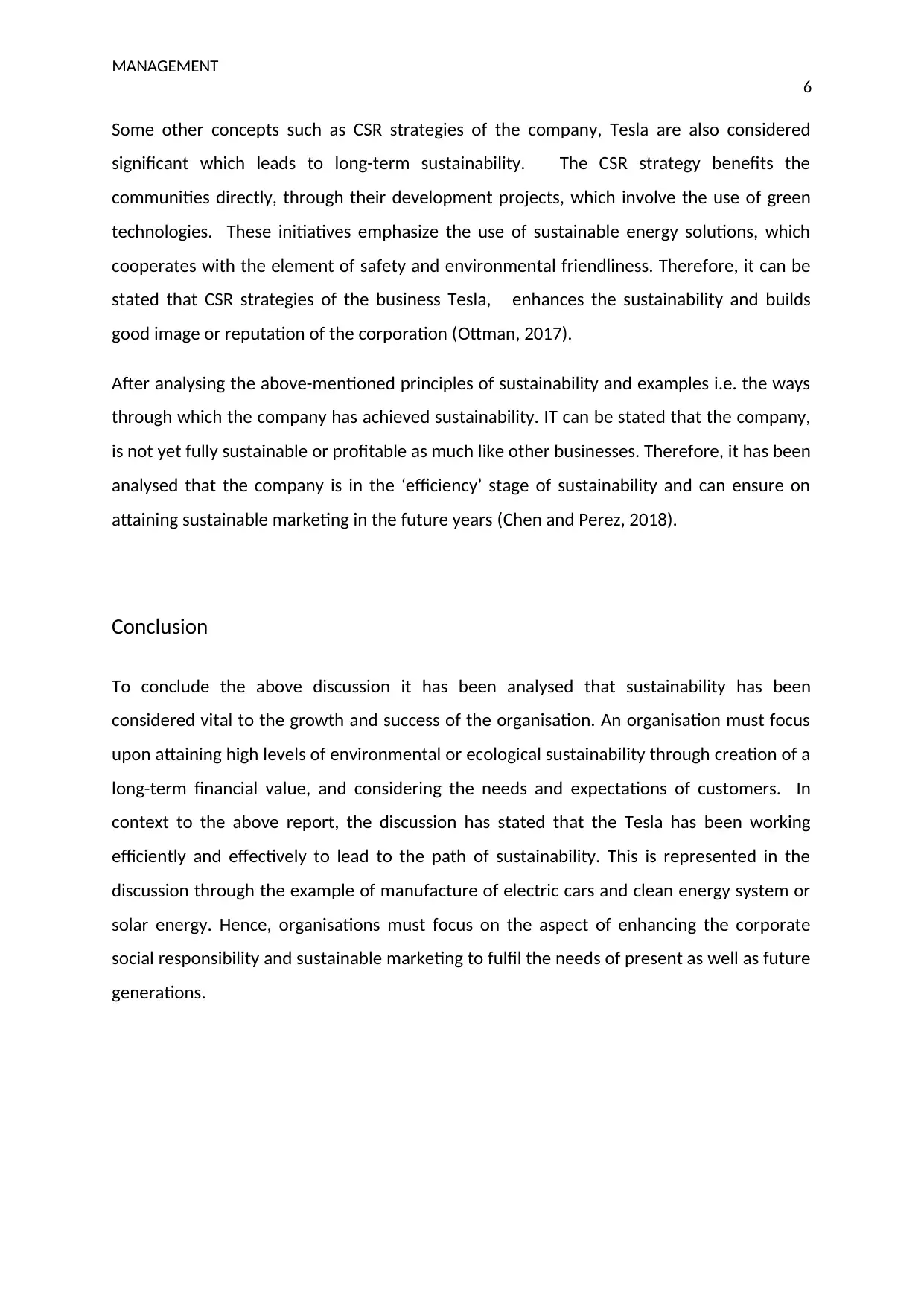
MANAGEMENT
6
Some other concepts such as CSR strategies of the company, Tesla are also considered
significant which leads to long-term sustainability. The CSR strategy benefits the
communities directly, through their development projects, which involve the use of green
technologies. These initiatives emphasize the use of sustainable energy solutions, which
cooperates with the element of safety and environmental friendliness. Therefore, it can be
stated that CSR strategies of the business Tesla, enhances the sustainability and builds
good image or reputation of the corporation (Ottman, 2017).
After analysing the above-mentioned principles of sustainability and examples i.e. the ways
through which the company has achieved sustainability. IT can be stated that the company,
is not yet fully sustainable or profitable as much like other businesses. Therefore, it has been
analysed that the company is in the ‘efficiency’ stage of sustainability and can ensure on
attaining sustainable marketing in the future years (Chen and Perez, 2018).
Conclusion
To conclude the above discussion it has been analysed that sustainability has been
considered vital to the growth and success of the organisation. An organisation must focus
upon attaining high levels of environmental or ecological sustainability through creation of a
long-term financial value, and considering the needs and expectations of customers. In
context to the above report, the discussion has stated that the Tesla has been working
efficiently and effectively to lead to the path of sustainability. This is represented in the
discussion through the example of manufacture of electric cars and clean energy system or
solar energy. Hence, organisations must focus on the aspect of enhancing the corporate
social responsibility and sustainable marketing to fulfil the needs of present as well as future
generations.
6
Some other concepts such as CSR strategies of the company, Tesla are also considered
significant which leads to long-term sustainability. The CSR strategy benefits the
communities directly, through their development projects, which involve the use of green
technologies. These initiatives emphasize the use of sustainable energy solutions, which
cooperates with the element of safety and environmental friendliness. Therefore, it can be
stated that CSR strategies of the business Tesla, enhances the sustainability and builds
good image or reputation of the corporation (Ottman, 2017).
After analysing the above-mentioned principles of sustainability and examples i.e. the ways
through which the company has achieved sustainability. IT can be stated that the company,
is not yet fully sustainable or profitable as much like other businesses. Therefore, it has been
analysed that the company is in the ‘efficiency’ stage of sustainability and can ensure on
attaining sustainable marketing in the future years (Chen and Perez, 2018).
Conclusion
To conclude the above discussion it has been analysed that sustainability has been
considered vital to the growth and success of the organisation. An organisation must focus
upon attaining high levels of environmental or ecological sustainability through creation of a
long-term financial value, and considering the needs and expectations of customers. In
context to the above report, the discussion has stated that the Tesla has been working
efficiently and effectively to lead to the path of sustainability. This is represented in the
discussion through the example of manufacture of electric cars and clean energy system or
solar energy. Hence, organisations must focus on the aspect of enhancing the corporate
social responsibility and sustainable marketing to fulfil the needs of present as well as future
generations.
Paraphrase This Document
Need a fresh take? Get an instant paraphrase of this document with our AI Paraphraser

MANAGEMENT
7
7
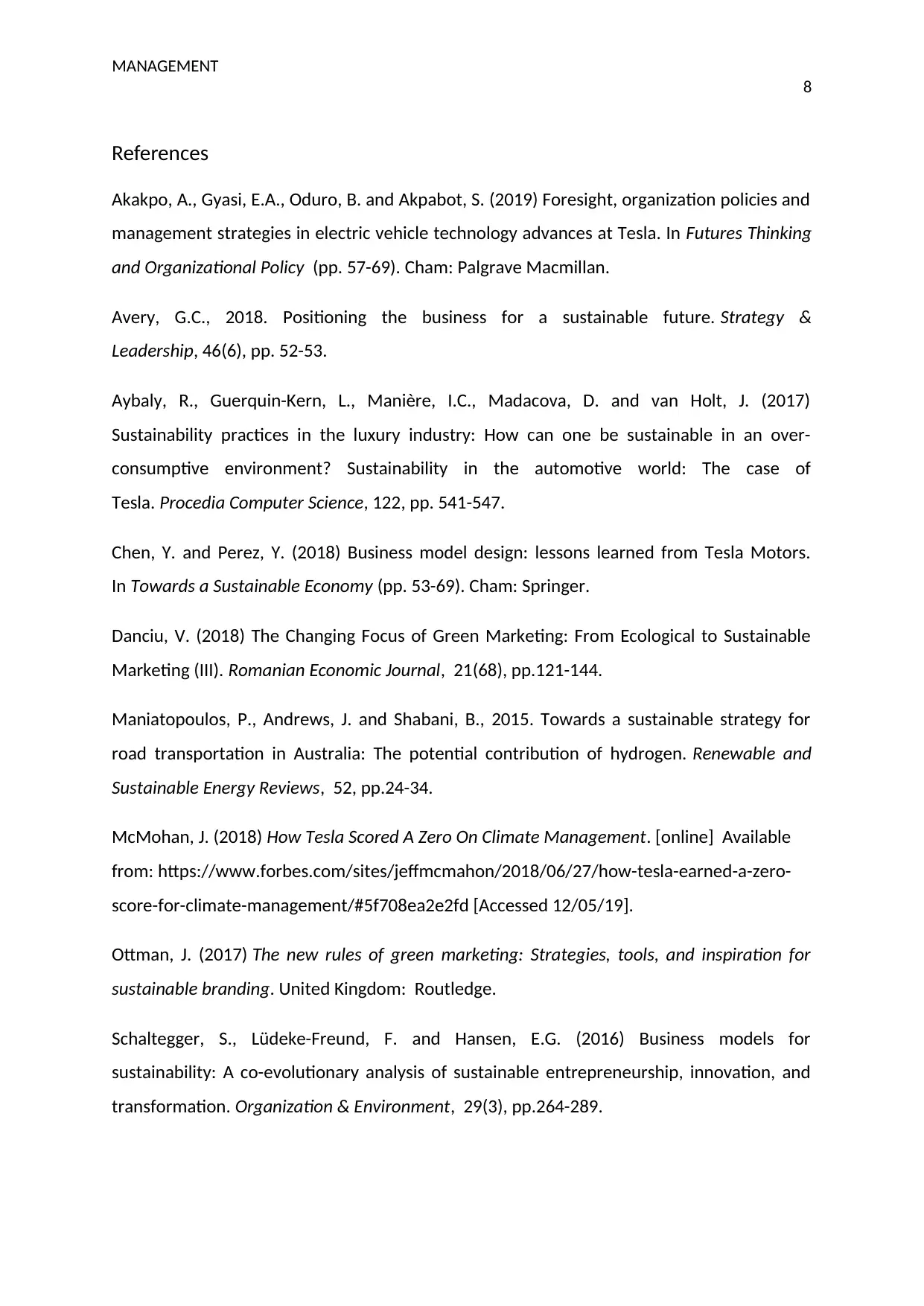
MANAGEMENT
8
References
Akakpo, A., Gyasi, E.A., Oduro, B. and Akpabot, S. (2019) Foresight, organization policies and
management strategies in electric vehicle technology advances at Tesla. In Futures Thinking
and Organizational Policy (pp. 57-69). Cham: Palgrave Macmillan.
Avery, G.C., 2018. Positioning the business for a sustainable future. Strategy &
Leadership, 46(6), pp. 52-53.
Aybaly, R., Guerquin-Kern, L., Manière, I.C., Madacova, D. and van Holt, J. (2017)
Sustainability practices in the luxury industry: How can one be sustainable in an over-
consumptive environment? Sustainability in the automotive world: The case of
Tesla. Procedia Computer Science, 122, pp. 541-547.
Chen, Y. and Perez, Y. (2018) Business model design: lessons learned from Tesla Motors.
In Towards a Sustainable Economy (pp. 53-69). Cham: Springer.
Danciu, V. (2018) The Changing Focus of Green Marketing: From Ecological to Sustainable
Marketing (III). Romanian Economic Journal, 21(68), pp.121-144.
Maniatopoulos, P., Andrews, J. and Shabani, B., 2015. Towards a sustainable strategy for
road transportation in Australia: The potential contribution of hydrogen. Renewable and
Sustainable Energy Reviews, 52, pp.24-34.
McMohan, J. (2018) How Tesla Scored A Zero On Climate Management. [online] Available
from: https://www.forbes.com/sites/jeffmcmahon/2018/06/27/how-tesla-earned-a-zero-
score-for-climate-management/#5f708ea2e2fd [Accessed 12/05/19].
Ottman, J. (2017) The new rules of green marketing: Strategies, tools, and inspiration for
sustainable branding. United Kingdom: Routledge.
Schaltegger, S., Lüdeke-Freund, F. and Hansen, E.G. (2016) Business models for
sustainability: A co-evolutionary analysis of sustainable entrepreneurship, innovation, and
transformation. Organization & Environment, 29(3), pp.264-289.
8
References
Akakpo, A., Gyasi, E.A., Oduro, B. and Akpabot, S. (2019) Foresight, organization policies and
management strategies in electric vehicle technology advances at Tesla. In Futures Thinking
and Organizational Policy (pp. 57-69). Cham: Palgrave Macmillan.
Avery, G.C., 2018. Positioning the business for a sustainable future. Strategy &
Leadership, 46(6), pp. 52-53.
Aybaly, R., Guerquin-Kern, L., Manière, I.C., Madacova, D. and van Holt, J. (2017)
Sustainability practices in the luxury industry: How can one be sustainable in an over-
consumptive environment? Sustainability in the automotive world: The case of
Tesla. Procedia Computer Science, 122, pp. 541-547.
Chen, Y. and Perez, Y. (2018) Business model design: lessons learned from Tesla Motors.
In Towards a Sustainable Economy (pp. 53-69). Cham: Springer.
Danciu, V. (2018) The Changing Focus of Green Marketing: From Ecological to Sustainable
Marketing (III). Romanian Economic Journal, 21(68), pp.121-144.
Maniatopoulos, P., Andrews, J. and Shabani, B., 2015. Towards a sustainable strategy for
road transportation in Australia: The potential contribution of hydrogen. Renewable and
Sustainable Energy Reviews, 52, pp.24-34.
McMohan, J. (2018) How Tesla Scored A Zero On Climate Management. [online] Available
from: https://www.forbes.com/sites/jeffmcmahon/2018/06/27/how-tesla-earned-a-zero-
score-for-climate-management/#5f708ea2e2fd [Accessed 12/05/19].
Ottman, J. (2017) The new rules of green marketing: Strategies, tools, and inspiration for
sustainable branding. United Kingdom: Routledge.
Schaltegger, S., Lüdeke-Freund, F. and Hansen, E.G. (2016) Business models for
sustainability: A co-evolutionary analysis of sustainable entrepreneurship, innovation, and
transformation. Organization & Environment, 29(3), pp.264-289.
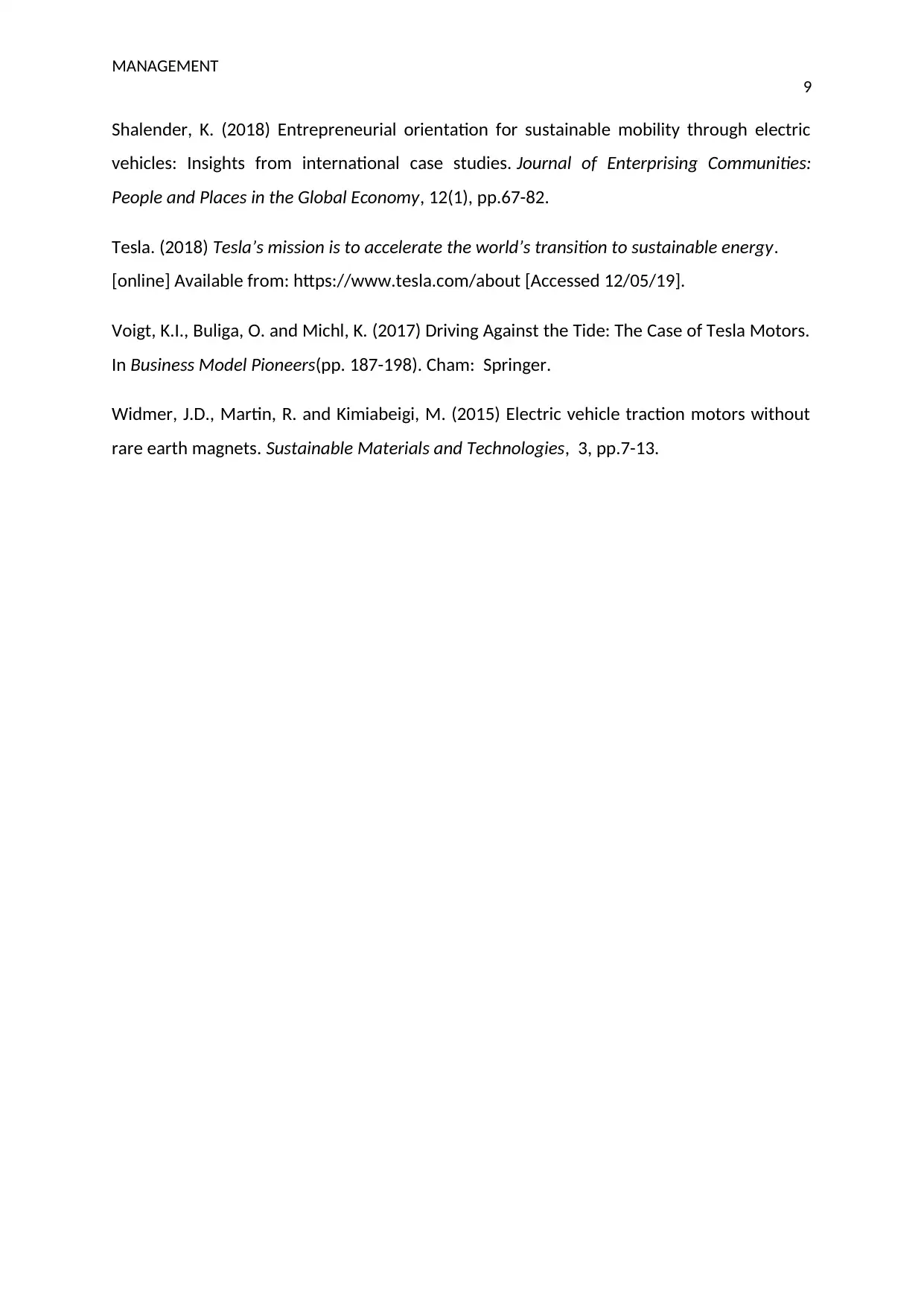
MANAGEMENT
9
Shalender, K. (2018) Entrepreneurial orientation for sustainable mobility through electric
vehicles: Insights from international case studies. Journal of Enterprising Communities:
People and Places in the Global Economy, 12(1), pp.67-82.
Tesla. (2018) Tesla’s mission is to accelerate the world’s transition to sustainable energy.
[online] Available from: https://www.tesla.com/about [Accessed 12/05/19].
Voigt, K.I., Buliga, O. and Michl, K. (2017) Driving Against the Tide: The Case of Tesla Motors.
In Business Model Pioneers(pp. 187-198). Cham: Springer.
Widmer, J.D., Martin, R. and Kimiabeigi, M. (2015) Electric vehicle traction motors without
rare earth magnets. Sustainable Materials and Technologies, 3, pp.7-13.
9
Shalender, K. (2018) Entrepreneurial orientation for sustainable mobility through electric
vehicles: Insights from international case studies. Journal of Enterprising Communities:
People and Places in the Global Economy, 12(1), pp.67-82.
Tesla. (2018) Tesla’s mission is to accelerate the world’s transition to sustainable energy.
[online] Available from: https://www.tesla.com/about [Accessed 12/05/19].
Voigt, K.I., Buliga, O. and Michl, K. (2017) Driving Against the Tide: The Case of Tesla Motors.
In Business Model Pioneers(pp. 187-198). Cham: Springer.
Widmer, J.D., Martin, R. and Kimiabeigi, M. (2015) Electric vehicle traction motors without
rare earth magnets. Sustainable Materials and Technologies, 3, pp.7-13.
1 out of 10
Related Documents
Your All-in-One AI-Powered Toolkit for Academic Success.
+13062052269
info@desklib.com
Available 24*7 on WhatsApp / Email
![[object Object]](/_next/static/media/star-bottom.7253800d.svg)
Unlock your academic potential
© 2024 | Zucol Services PVT LTD | All rights reserved.




